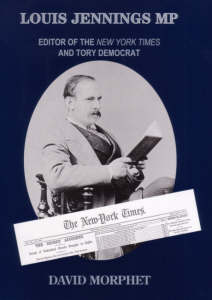Louis Jennings MP – Editor of the New York Times and Tory Democrat [2001]

21.5 x 15 cm hardback bound in dark blue cloth with illustrated dust cover, 276 pp, with illustrations
ISBN 09541573 0 3
£17.99
Summary
The biography of a journalist, author and politician, born in London in 1837, who worked for the London Times as Correspondent in Calcutta in 1864 and the post-Civil War United States from 1865-67, became Editor of the New York Yimes from 1869-76, where he engineered the downfall of a corrupt Tammany Hall ring led by ‘Boss’ Tweed. On return to England, following a failed attempt to gain ownership of the New York Times, he was engaged by the publisher John Murray to edit the Papers of John Wilson Croker and to write the political article in the conservative Quarterly Review, which he did for a number of years. In 1885 he was elected to Parliament as Member for the industrial constituency of Stockport in Cheshire. In Parliament he became for a time a leading supporter of Lord Randolph Churchill in the latter’s promotion of ‘Tory Democracy’, only to dissociate himself from Churchill in 1890 in an attack on the floor of the House of Commons.
He published eight books including a critique of Gladstone and a book on country walks entitled Field Paths and Green Lanes in Surrey and Sussex. He died in 1893, aged 56, following a long period of ill health.
Background & Literary Review
The biography came about following my discovery from Who’s Who that my wife Sarah’s great-uncle Lt Col. Francis Sedgwick CMG DSO (1876-1955) had married twice, and that his first wife was Madeleine, daughter of Louis Jennings MP. We knew nothing about Madeleine or her father and I began my researches. Initially I expected to produce a monograph of up to 10,000 words at most. Interest grew with the discovery that Louis Jennings MP for Stockport was not, as I initially supposed, a Northern industrialist who had turned his hand to Conservative politics, but a journalist with a record as a correspondent of The Times in India and the United States, and a vigorous career as Editor of the New York Times; and subsequently as a regular contributor of the political article to the Quarterly Review. a flagship of Victorian journalism. Not only that, but he had edited, in three volumes, the Papers of John Wilson Croker, Secretary of the Admiralty, founder of the Athenaeum, and long-standing contributor of the political article to the Quarterly Review. Later, he had for a time been a leading supporter in Parliament of Lord Randolph Churchill, father of Winston.
That the monograph became a book was due to the existence of substantial written records. These included letters between Jennings and The Times, preserved in the archives of The Times; letters from Jennings to John Murray, his publisher, preserved in the Murray archives; and letters to Lord Randolph Chirchill preserved in the Chirchill archive in Cambridge. There were also documents relating to his tome as Editor of the New York Times, and a variety of other material came to light in libraries and public records.
The book was favorably reviewed in the Victorian Periodicals Review Vol 38, Number 3 of Fall 2003, which had previously published (Vol38, Number 2 of Summer 2003) my article on ‘Political comment in the Quarterly Review after Croker: Gladstone, Salisbury and Jennings’.
A review by E S Turner appeared in the Times Literary Supplement of May 24, 2002, of which the text follows:
“Forgotten by all but David Morphet is Louis Jennings, the London-born Editor of the New York Times who at thirty-five toppled Tammany Hall’s ‘Boss’ Tweed, the Moriarty of corruption in New York between 1868 and 1871. This was muck-raking of the highest order, all the more remarkable for being performed by a strong-nerved Englishman, when American editors funked the challenge, or were themselves in Tweed’s camp. The damning evidence was virtually dropped in Jennings’s lap but his fiery pen exploited it brilliantly…….
The judicious Morphet is in full control of the subject but his problem is two-fold: that Jennings’s finest hour came too early, and that the Indian and American backgrounds hold more fascination than the British. As they said in New York, Jennings had ‘an exceptional talent for stirring up the animals’, but a passion for polemics, says Morphet, was his limitation. So was ‘an impetuous streak in his temperament which, allied with strong political feelings, led him to fatal miscalculations“.
About the name Notion Books
In publishing his biography of Louis Jennings in 2001 David Morphet used the rubric ‘Notion Books’. He took the name ‘Notion’ from a deliberately misleading remark by Jennings when on one occasion he was asked what he did for a living. He replied that he ‘travelled in notions’ – ‘notions’ being a contemporary term for small household items such as needles and buttons. For Jennings, the word ‘notions’ had of course much wider connotations.
St John’s College Cambridge: Excellence and Diversity
This fully illustrated account of a large Cambridge college, edited by David Morphet at the invitation of the then Master of the College, was published in 2007 by Third Millennium Publishing, London.